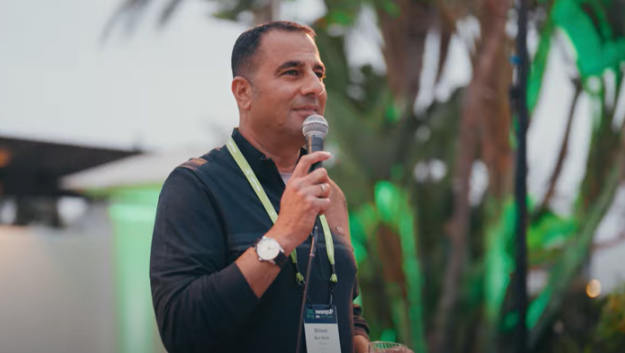 CLOUD
CLOUD
 CLOUD
CLOUD
 CLOUD
CLOUD
JFrog Ltd. delivered strong third-quarter results today that came in above Wall Street’s expectations.
The software supply chain tooling company also provided a strong forecast for the coming quarter, despite seeing its business hurt by the conflict in Israel, where more than half of its employees are based. The strong report and confident guidance lifted JFrog’s stock by more than 15% in the after-hours trading session.
The company reported earnings before certain costs such as stock compensation of 15 cents per share, beating its own guidance range of eight to nine cents and Wall Street’s target of eight cents. Revenue rose 23% from a year ago, to $88.6 million, ahead of the $87.6 million consensus estimate. All told, JFrog delivered a net loss of $13.7 million, improving on the $23.5 million loss one year ago.
In a statement, co-founder and Chief Executive Shlomi Ben Haim (pictured) said the company’s strong results illustrate the ongoing adoption of its hybrid software supply chain platform by enterprises. “We remain confident about driving further growth in the final quarter of the year,” he added.
JFrog is the creator of the open-source binary code repository manager, Artifactory. Unlike the better-known GitHub platform, which is used to store application code, Artifactory is used to store the binary files created when engineers compile their code into functioning applications.
The company also sells JFrog Pipelines, which is a continuous integration and continuous delivery platform used by developers to create automated software workflows that can transform raw code into binaries before deploying them automatically.
Highlights from the quarter include cloud revenue growing by 46% from a year earlier to $30.6 million, accounting for 35% of the company’s total sales, up from just 29% previously. The company also added six new customers who generate annual revenue of more than $1 million, bringing its total to 30, up from just 18 one year earlier.
In an interview with Barron’s, Ben Haim revealed that fewer than 100 of the company’s 800-plus employees based in Israel have been called up for active duty by the Israel Defense Forces. The company activated its business continuity emergency plan just two hours after Israel was attacked by Hamas, he said. Since then, he has tried to keep the business running with minimal disruption.
“We are looking at the situation and monitoring it, and being very thoughtful,” Ben Haim said. “We are not changing our financial guidance, and we have full confidence that we will deliver.”
Analyst Holger Mueller of Constellation Research Inc. said JFrog has benefited from the inescapable fact that software now rules the world, and that every company has become a software company. It means that those companies who provide the tools to build that software will continue to grow, he added. “This is why JFrog once again delivered great results, growing by more than 20%,” Mueller explained. “Because its revenue grew faster than its cost base, Ben Haim and team were able to deliver a more profitable JFrog, though it is still losing money for now. The main question JFrog faces is how the situation in Israel will affect its business operations, but for now it’s still delivering the goods.”
For the fourth quarter, JFrog sees revenue of between $92.5 million and $93.5 million, with earnings of between 12 and 13 cents per share. Wall Street is looking for $92.9 million in sales and earnings of eight cents per share.
JFrog’s stock has underperformed the market this year, and was up just 6% in the year to date, prior to today’s gains.
Support our mission to keep content open and free by engaging with theCUBE community. Join theCUBE’s Alumni Trust Network, where technology leaders connect, share intelligence and create opportunities.
Founded by tech visionaries John Furrier and Dave Vellante, SiliconANGLE Media has built a dynamic ecosystem of industry-leading digital media brands that reach 15+ million elite tech professionals. Our new proprietary theCUBE AI Video Cloud is breaking ground in audience interaction, leveraging theCUBEai.com neural network to help technology companies make data-driven decisions and stay at the forefront of industry conversations.